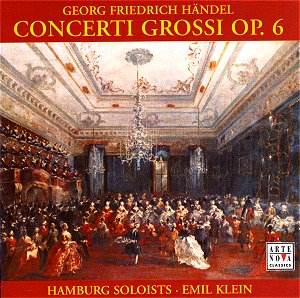Handel was the greatest cosmopolitan of the age: a German composer, living in London, writing Italian operas. Of course he also wrote a good deal more, such as the oratorios in English which became his stock-in-trade when the Italian opera went out of fashion. He was an immensely practical musician, who made his way by collaborating with the best artists of the day and working at the highest levels of performance, creating the music the audience wanted, having already made a strong impression on the direction of public taste.
Alongside the Brandenburg Concertos of Bach, Handel's Opus 6 concerto grossi form the summit of baroque orchestral music. They came into being in a manner typical of Handel's career. When the concerti of the Italian ex-patriot Bononcini became all the rage in London, Handel's publisher, John Walsh, suggested to the great man that he might compose something along similar lines. He duly obliged, and six weeks later he completed these twelve concertos.
The twelve concertos are essentially string music, with keyboard continuo and in some editions the option of oboe parts also, which are not employed here. Handel's formula is closest to the model of the concerto da chiesa established by Corelli a generation before, with the alternation of quicker and slower identities, and with a concertino group of two violins and cello set against the ensemble. However, in great music such as this it is dangerous to be too prescriptive in one's descriptions, since there are so many varieties and shadings.
The concertos abound in wonderful subtleties and enjoy the highest levels of inspiration, and all twelve of them are thoroughly worthy of Handel's genius. So too these performances, which are beautifully recorded in a sympathetically ambient acoustic. At the asking price (bargain price) there is everything to gain and nothing to lose. For example, the relationship between the harpsichord continuo and the string body is just right in timbre and perspective; the keyboard instrument can clearly be heard without becoming too obtrusive.
The string sound is pleasing too, although the full tone of steel rather than gut strings will frustrate some purists. Details can always make their point within the texture, and the performances are nicely shaped and thoughtfully paced. That said, if there is a weakness it is towards indulgence of the moment at the expense of the line. The least satisfactory interpretation, to my ears at least, was that of arguably the greatest of the concertos, No. 12. The memorable and noble Larghetto Aria movement is taken so slowly, with limp rhythmic phrasing, that it seems shapeless.
Fortunately this lapse is the exception, and in many instances the tempi seem absolutely right. The two noble slow movements of Concerto No. 4 are most pleasing, for example, while the complex textures of the fugal developments are clear and at the same time exciting. The accompanying booklet is nicely produced if rather thin on content.
Terry Barfoot


